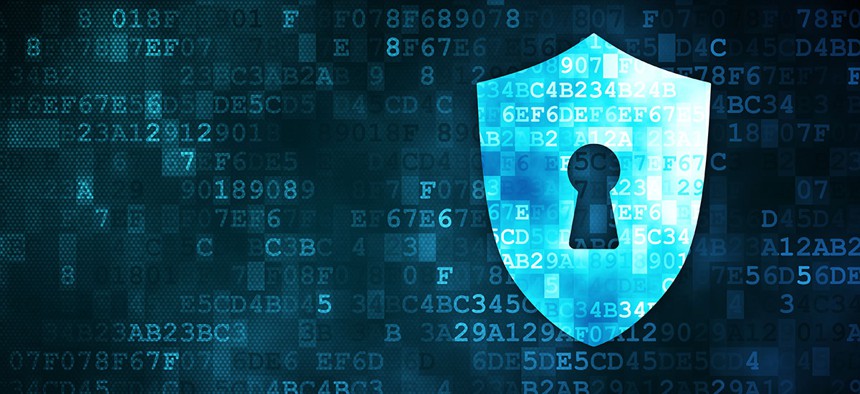Government Officials Just Really Like the Word 'Cyber'

Maksim Kabakou/Shutterstock.com
Hacking is not hacking—it’s cybercrime.
County prosecutors have offered a new reason Apple should help unlock the iPhone used by one of the alleged shooters in San Bernardino: a “dormant cyber pathogen.”
In a briefing filed on Thursday (March 3), the prosecutors suggested the phone may have been used to release the “pathogen” into San Bernardino’s local government computer network:
The iPhone is a county owned telephone that may have connected to the San Bernardino County computer network. The seized iPhone may contain evidence that can only be found on the seized phone that it was used as a weapon to introduce a lying dormant cyber pathogen that endangers San Bernardino’s infrastructure.
So what exactly is a cyber pathogen? Well, nothing. It’s not a thing. If you had Googled the phrase before the San Bernardino district attorney started using it earlier this year, you wouldn’t have gotten any results. Forensics expert Jonathan Zdziarski told Ars Technica “the district attorney is suggesting that a ‘magical unicorn might exist on this phone.'”
“It sounds like he’s making up these terms as he goes,” Zdziarski added. “We’ve never used these terms in computer science.”
Using the word “cyber” to make something sound more threatening or official or downright magical is not a new tactic, particularly for government officials. Hacking is not hacking—it’s cybercrime. If a nation state is involved, it’s cyberwar. When a company uses a firewall, it’s just a firewall. But when the government uses one, it’s cybersecurity. (There’s also a Cybersecurity Awareness Month, by the way. It’s October.)
In a 2013 deep-dive into the history of “cyber,” author Bruce Sterling told io9 he had a theory about the word’s use:
I think I know why the military calls it “cyber”—it’s because the metaphor of defending a “battlespace” made of “cyberspace” makes it easier for certain contractors to get Pentagon grants. If you call “cyberspace” by the alternate paradigm of “networks, wires, tubes and cables” then the NSA has already owned that for fifty years and the armed services can’t get a word in.
Whatever the reason, the government certainly uses the word a lot. We analyzed every mention of “cyber” on the congressional record since 2000, via Capitol Words by the Sunlight Foundation. We found 80 distinct uses of the word, which we’ve listed below. Some standouts include “cybersquatting,” “cyberpatriot” and “cyber introverts.”
| Phrase | Count |
|---|---|
| cyber security | 268 |
| cyber threat(s) | 123 |
| cyber attack(s) | 87 |
| cyber crime(s) | 56 |
| cyber defense(s) | 30 |
| cyber space | 22 |
| cyber command | 20 |
| cyber incident(s) | 15 |
| cyber network(s) | 10 |
| cyber bill | 7 |
| cyber communications | 7 |
| cyber infrastructure | 6 |
| cyber intelligence | 6 |
| cyber trespass | 5 |
| cyber criminals | 4 |
| cyber issue(s) | 4 |
| cyber privacy | 4 |
| cyber risk(s) | 4 |
| cyber emergencies | 3 |
| cyber espionage | 3 |
| cyber future | 3 |
| cyber intrusions | 3 |
| cyber matters | 3 |
| cyber organization | 3 |
| cyberpiracy | 3 |
| cyber scholarship | 3 |
| cybersquatting | 3 |
| cyber system(s) | 3 |
| cyber terrorism | 3 |
| cyber warfare | 3 |
| cyber actor | 2 |
| cyber breaches | 2 |
| cyber center(s) | 2 |
| cyber director | 2 |
| cyber education | 2 |
| cyber hygiene | 2 |
| cyber intent | 2 |
| cyber investigations | 2 |
| cyber investigative | 2 |
| cyber legislation | 2 |
| cyber monday | 2 |
| cyberpatriot | 2 |
| cyber theft | 2 |
| cyber week | 2 |
| cyber workforce | 2 |
| cyber academy | 1 |
| cyber action | 1 |
| cyber activities | 1 |
| cyber area | 1 |
| cyber attacked | 1 |
| cyber authorities | 1 |
| cyber bank | 1 |
| cyber behavior | 1 |
| cyber bullies | 1 |
| cyber cafes | 1 |
| cyber critical | 1 |
| cyber curriculum | 1 |
| cyber economic | 1 |
| cyber hacks | 1 |
| cyber information | 1 |
| cyber initiative | 1 |
| cyber insurance | 1 |
| cyber introverts | 1 |
| cyber means | 1 |
| cyber pearl | 1 |
| cyber penetrations | 1 |
| cyber policy | 1 |
| cyber predators | 1 |
| cyber service | 1 |
| cyber smuggling | 1 |
| cyberspies | 1 |
| cyber strategic | 1 |
| cyber support | 1 |
| cyber terrorists | 1 |
| cyber tip | 1 |
| cyber tipline | 1 |
| cyber training | 1 |
| cyber vulnerabilities | 1 |
| cyber war | 1 |
| cyber warrior | 1 |
| cyber youth | 1 |
Note: Counts include instances of mentions with and without spaces.
(Image via Maksim Kabakou/Shutterstock.com)





